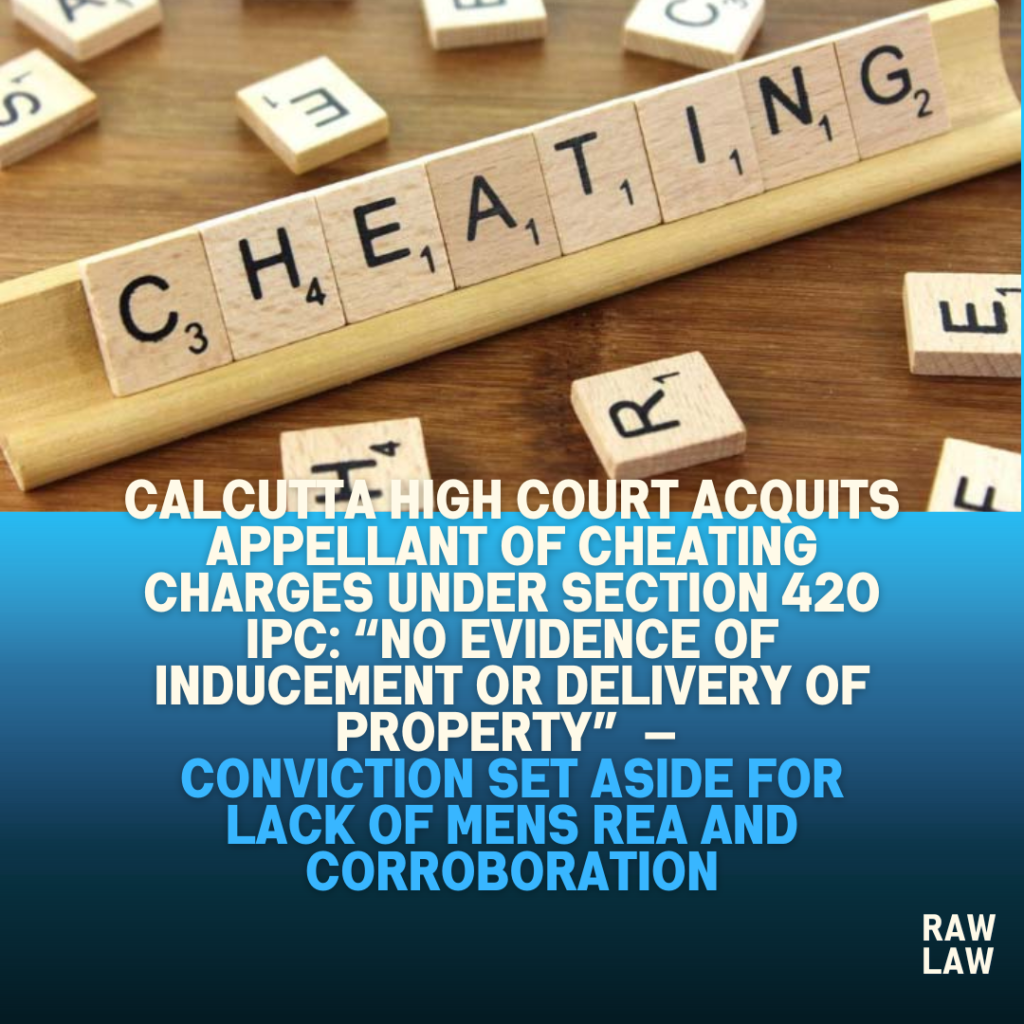Court’s Decision
The Calcutta High Court allowed the criminal appeal and set aside the conviction and sentence under Section 420 IPC. The Court held that the essential ingredients of the offence—namely, dishonest inducement leading to the delivery of property—were not established. It observed that “in order to prove the case of the prosecution for the offence of cheating punishable under section 420 IPC, it has to be proved that the accused had fraudulently or dishonestly induced the complainant and by such inducement the complainant was deceived and delivered some property to the accused.” Since this was not established, the Court quashed the conviction and acquitted the appellant.
Facts
The appellant had been convicted by the Additional Sessions Judge, 5th Court, Barasat, for the offence under Section 420 IPC and sentenced to three years’ simple imprisonment along with a fine of ₹1,00,000, and in default, to serve an additional year of simple imprisonment. The conviction arose from a complaint alleging that the appellant had a romantic relationship with the complainant since 1997, engaged in sexual relations with a promise to marry, compelled her to abort a pregnancy, and took money from her and her family before ultimately not marrying her. The complainant later discovered the appellant was already married. On the basis of her complaint, an FIR was registered, and a charge sheet was filed under Sections 376, 417, 313, and 509 IPC. The appellant, however, was convicted only under Section 420 IPC.
Issues
- Whether the appellant dishonestly induced the complainant to deliver any property, thereby constituting an offence under Section 420 IPC.
- Whether the prosecution established the essential ingredients of cheating beyond reasonable doubt.
Petitioner’s Arguments
The appellant’s counsel argued that:
- There were no ingredients of Section 420 IPC made out against the appellant.
- No evidence or documentation existed to prove any transaction of money.
- The complainant’s claim that money was taken was uncorroborated and unsupported by any other prosecution witness.
- No document was seized by the Investigating Officer to establish the alleged financial transaction.
- Even the complainant admitted that she and the appellant were married and lived together, which contradicted the charge of deception.
Respondent’s Arguments
The State’s counsel fairly conceded that:
- There was no material on record to support the charge under Section 420 IPC.
- No property or money transaction was proven.
- No documents were seized, and the testimony of the complainant was uncorroborated.
- The basic requirements of cheating under Section 420 were not satisfied.
Analysis of the Law
The Court explained that under Section 420 IPC, it must be shown:
- The accused dishonestly induced the complainant.
- The complainant was deceived.
- There was delivery of property or alteration of a valuable security.
It emphasized that a deceitful act alone is insufficient unless it leads to delivery of property as a result of the inducement.
Precedent Analysis
The Court relied extensively on:
- Mariam Fasihuddin v. State by Adugodi PS & Anr., 2024 LiveLaw (SC) 53
The Supreme Court held that for Section 420 IPC to apply, mere cheating is not enough—there must be dishonest inducement leading to the delivery of property. The judgment clarified that there are three essential elements: deception, inducement to deliver property, and dishonest intention at the time of inducement.
Court’s Reasoning
The Court found that:
- PW5 (the complainant) made an uncorroborated statement that the appellant took money.
- No other witnesses supported her version.
- No documents or material evidence were brought on record to prove financial transactions.
- The appellant’s Section 313 CrPC statement clarified that he had arranged a loan for the complainant, which she later misused against him when he refused to live as a ‘ghar jamai’.
Considering the absence of any tangible evidence to establish cheating or delivery of property due to inducement, the Court concluded that the conviction could not stand.
Conclusion
The High Court set aside the conviction dated 22.09.2015 and acquitted the appellant of all charges under Section 420 IPC. The appellant was discharged from his bail bond and set at liberty.
Implications
This judgment reinforces the principle that allegations under Section 420 IPC must be supported by specific evidence of deceitful inducement leading to delivery of property. Mere allegations or romantic disputes, without proof of financial transactions and mens rea, cannot form the basis of a criminal conviction. The Court also highlighted the importance of corroboration and due scrutiny in criminal trials involving personal allegations.
Summary of Case Referred
Mariam Fasihuddin v. State by Adugodi Police Station, 2024 LiveLaw (SC) 53
- Held that to convict under Section 420 IPC, prosecution must prove:
- Deception,
- Inducement to deliver property,
- Mens rea at the time of inducement.
- Deception,
Clarified that personal disputes must be distinguished from criminal offences unless ingredients of the offence are clearly met.



